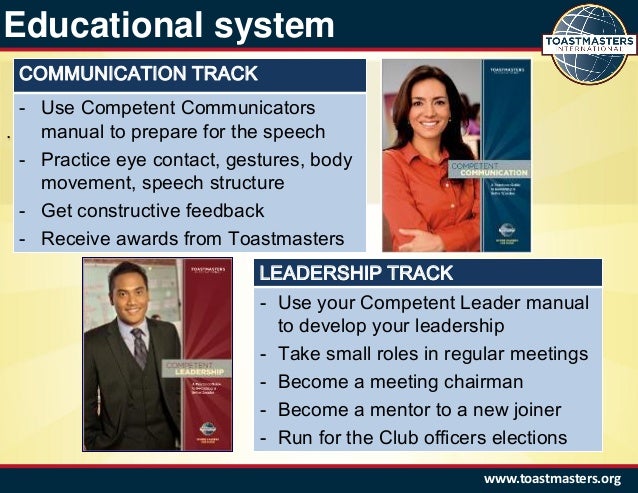This manual contains the first 10 speeches that you will complete as a Toastmaster. When you complete these speeches, you will receive the Competent Communicator (CC) designation. The CC has replaced the Competent Toastmaster (CTM) designation.
Toastmasters Competent Communicator Manual.pdf Free Download Here Competent Communication Manual - 1st London Toastmasters. Toastmasters Competent Communicator.


1. The Ice Breaker For your first speech project, you will introduce yourself to your fellow club members and give them some information about your background, interests, and ambitions. Practice giving your speech to friends or family members, and strive to make eye contact with some of your audience. You may use notes during your speech if you wish. Read the entire project before preparing your talk.
2. Organize Your Speech Good speech organization is essential if your audience is to understand your presentation. You must take the time to put your ideas together in an orderly manner. You can organize your speech in several different ways; choose the outline that best suits your topic. The opening should catch the audience's attention, the body must support the idea you want to convey, and the conclusion should reinforce your ideas and be memorable. Transitions between thoughts should be smooth.
3. Get to the Point Every speech must have a general an a specific purpose. A general purpose is to inform, to persuade, to entertain, or to inspire. A specific purpose is what you want the audience to do after listening to your speech. Once you have established your general and specific purposes, you'll find it easy to organize your speech. You'll also have more confidence, which makes you more convincing, enthusiastic, and sincere. Of course, the better organized the speech is, the more likely it is to achieve your purpose.
4. How to Say It Words are powerful. They convey your message and influence the audience and its perception of you. Word choice and arrangement need just as much attention as speech organization and purpose. Select clear, accurate, descriptive and short words that best communicate your ideas and arrange them effectively and correctly. Every word should add value, meaning, and punch to the speech.
5. Your Body Speaks Body language is an important part of speaking because it enhances your message and gives you more credibility. It also helps release any nervousness you may feel. Stance, movement, gestures, facial expressions, and eye contact help communicate your message and achieve your speech's purpose. Body language should be smooth, natural, and convey the same message that your listeners hear. Read: Gestures: Your Body Speaks (Catalog #201), which you received in your New Member Kit.
6. Vocal Variety Your voice has a major effect on your audience. A lively, excited voice attracts and keeps listeners' attention. A speaking voice should be pleasant, natural, forceful, expressive, and easily heard. Use volume, pitch, rate, and quality as well as appropriate pauses to reflect and add meaning and interest to your message. Your voice should reflect the thoughts you are presenting. Review Your Speaking Voice (Catalog #199), which you received in your New Member Kit.
7. Research Your Topic Your speech will be more effective if you can support your main points with statistics, testimony, stories, anecdotes, examples, visual aids and facts. You can find this material on the Internet, at a library, and in other places. Use information collected from numerous sources and carefully support points with specific facts, examples and illustrations, rather than with just your own opinions.
8. Get Comfortable with Visual Aids Visual aids help an audience understand and remember what they hear; they are a valuable tool for speakers. The most popular visual aid are computer-based visuals, overhead transparencies, flip charts, whiteboards, and props. The type of visual aid you choose depends on several factors, including the information you wish to display and the size of the audience. Visuals must be appropriate for your message and the audience, and be displayed correctly with ease and confidence.
9. Persuade with Power The ability to persuade - to get other people to understand, accept, and act upon your ideas - is a valuable skill. Your listeners will be more likely to be persuaded if they perceive you as credible, if you use logic and emotion in your appeal, if you carefully structure your speech and if you appeal to their interests. Avoid using notes because they may cause listeners to doubt your sincerity, knowledge, and conviction.
10. Inspire Your Audience An inspirational speech motivates an audience to improve personally, emotionally, professionally, or spiritually and relies heavily on emotional appeal. It brings the audience together in a mood of fellowship and shared desire, builds the audience's enthusiasm, then proposes a change or plan and appeals to the audience to adopt this change or plan. This speech will last longer than your previous talks, so make arrangements in advance with your VP Education and meeting Toastmaster for extra time.
| ||||||||||||||||||||||||||||||||||||||||||||||||||||||||||||||||||||||||||||||||||||||||||||||||||||||
It looks like you’ve followed a bad link or URL. The District 25 website recently went through a major upgrade and transfer to a new server (Winter 2017). This means a lot of links to pages on the old site are now broken.
There are a number of ways you can find what you are looking for.
You can use Search to find the latest information on the subject you were looking for. Click the magnifying glass in the upper right of this page or any page to start your search.
Why Competent Communicator Toastmasters
You can go to the home page to find the latest and greatest.
If you know you want to find some link from the old website, make a minor change to the URL. Instead of it starting with www.d25toastmasters.org, it should start with past.d25toastmasters.org.

Toastmasters
Lastly, we are only using secure pages on our sites now. If you go to a page with a URL that starts with http, you may encounter problems. Please start all URLs with https.



